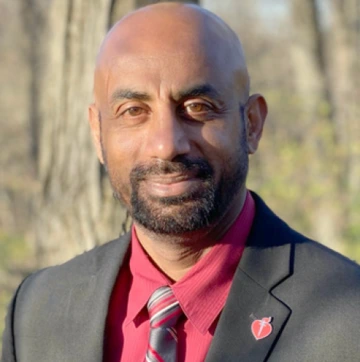When

Monday, February 10, 2025 - 12:00 p.m.
Sakthivel Sadayappan
Professor and Department Head of Cellular & Molecular Medicine
Associate Director, Sarver Heart Center
Czarina M. & Humberto S. Lopez Endowed Chair
University of Arizona College of Medicine
"Beating Hearts in a Petri Dish for Drug Discovery"
Keating 103 | Lunch included
Zoom link | Password: BearDown
Hosts: Alex McGhee and Swarna Ganesh
(Instructor permission required for enrolled students to attend via Zoom)
Persons with a disability may request a reasonable accommodation by contacting the Disability Resource Center at 621-3268 (V/TTY).

Abstract: Our recent work leverages human-induced pluripotent stem cell (hiPSC)-derived cardiac organoids as a groundbreaking platform for modeling hypertrophic cardiomyopathy (HCM). This seminar will delve into findings on the MYBPC3 D389V variant, which drives hypercontractility in cardiac organoids, shedding light on underlying molecular mechanisms and therapeutic approaches. Using advanced techniques such as RNA sequencing, contractility assays, and spatial mapping, we uncover critical cellular and functional insights. We will also explore the transformative potential of organoid models in personalized drug discovery and their translational significance for tackling cardiovascular diseases.
Bio: Dr. Sadayappan's research is driven by the desire to improve cardiac health with the long-term goal of treating and preventing the development of genetically induced heart failure, such as hypertrophic cardiomyopathy, congenital heart disease, and dilated cardiomyopathy. In the last five years, he has expanded his portfolio to define skeletal muscle genetic diseases, such as distal arthrogryposis and Lethal Congenital Contracture Syndrome. Dr. Sadayappan and his team have focused on studying the regulation of cardiac, skeletal, and smooth muscles in health and various pathophysiological conditions. Specifically, his studies include iPSC-derived cardiomyocytes, iPSC-derived cardiac organoids, genetically engineered mouse models, and gene corrections using CRISPR-mediated gene therapy, AAV-mediated gene therapy, and antisense oligonucleotides. His research lab works directly with various pharmaceutical companies to perform translational preclinical and clinical trials. Some ongoing studies aim to develop small-molecule and peptide therapies to treat heart failure.
